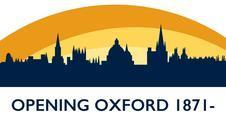Theology and Religion and the Universities Tests Act
The Honour School, or Bachelor of Arts degree, in Theology at Oxford was introduced just one year before the Universities Tests Act, and its evolution over 150 years has been shaped by the legacy of that legislation. Its initial content and character were strongly influenced by the ascendancy of the Oxford Movement in a previous generation, which had promoted rigorous spiritual discipline, and emphasised the continuity of Anglican liturgy and doctrine with Christian thought and practice in antiquity. A future Regius Professor of Divinity, the Revd. William Ince, lamented in 1875 that the devotional mood at Oxford had changed; it was no longer an age in which the ‘the old port-wine-drinking fellow’ had given way to the zealous ‘young tractarian tutor’. Nonetheless, he assured his fellow churchmen that the impact of the recent legislation on theological instruction at Oxford had been ‘comparatively small’.
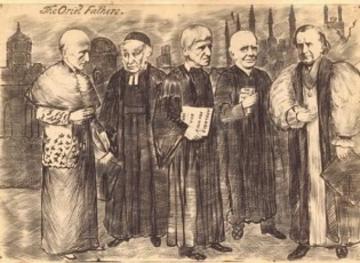
Early 20th century cartoon depicting the “Oriel Fathers”, leading lights in the Oxford Movement.
The new Honour School was essentially a training in Anglican ‘apologetics’, or defence of the established Church against Roman Catholic and Dissenting critics. The earliest papers for the second public examination, in fact, included a section on apologetics, with questions on Richard Hooker’s defences against the puritans. Other sections on Liturgy and Ecclesiastical History centred on Anglican or early Christian tradition and included quite recherché topics. I can only imagine the laconic response of some current undergraduates to questions such as: ‘What do you know of – Artemon, Porphyrius, John the Presbyter, Bacchylus, Mazabanes, Amonius, Herclas, Ischyrion, Maximus the Cynic, Hippolytus, Isidore, Hypatia, Gorgonius, Hermophilus, Dioscorus, the Council of Laodicea, the Council of Gangra, St Ninian?’ One is reminded of a question on one of the ‘test papers’ in 1066 and All That: ‘What have you the faintest recollection of?’ By the early twentieth century, priorities in teaching and examining had clearly shifted, and students were required to engage fully with contemporary critical approaches in biblical studies, among other fields.
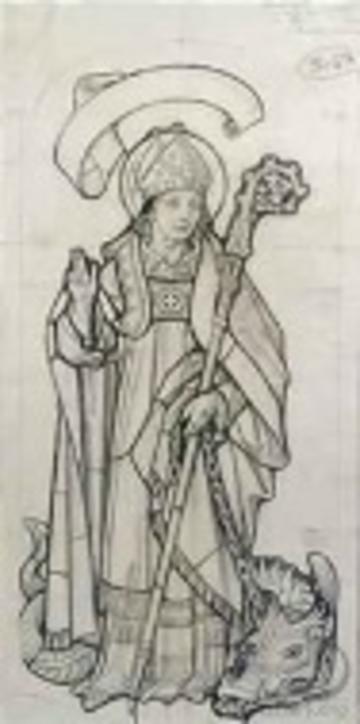
St Ninian by William Daniels (1813-80).
Until 1904, it remained a requirement that examiners for Theology should be in Holy Orders in the Church of England, and until 1912 a similar requirement pertained for candidates for the Bachelor of Divinity and Doctor of Divinity degrees. In 1891, The Contemporary Review had deplored this state of affairs, complaining that Dissenters could not be awarded the higher divinity degrees, despite the fact that ‘in the very centre of Anglican learning’, they had been distinguishing themselves in the Honour School, winning the essay prizes in disproportionate numbers.
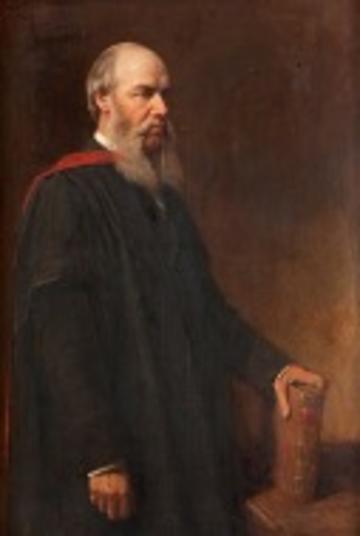
Edward Caird (1835-1908).
From the outset, however, there were more generous visions of the potential for theological and religious studies at Oxford. One prominent advocate for the abolition of the tests, the Hegelian scholar Charles Appleton, suggested in his evidence to the House of Lords in March 1871 that a Jewish faculty of theology could be incorporated within the University, and that ‘it would be an exceedingly useful institution’. Non-Anglican theologians were becoming increasingly visible and successful, greatly encouraged by the arrival in the 1880s of new institutions such as Mansfield and Manchester Colleges, and Catholic private halls from 1896. The ideological shift towards a de-confessionalised study of theology and religion came in part from these freshly-included voices. The Presbyterian philosopher of religion Edward Caird, Master of Balliol, advocated an approach to theological study which emphasised the evolutionary, contextual character of religions. In September 1908, the Third International Congress of the History of Religions met in Oxford, putting theologians into conversation with anthropologists, historians, geographers, and philosophers from across the world. The topics covered by some 600 attending scholars were wide-ranging, from Celtic religions and Chinese sky-gods to Egyptian funerary cults and Minoan Crete.
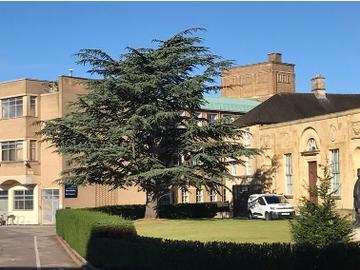
The Gibson Building, current home to Oxford's Faculty of Theology and Religion.
In recent times, the Faculty of Theology and Religion at Oxford made headlines by reforming its undergraduate curriculum, at least in certain confessional news outlets. ‘Oxford Theology Students’ it was reported, were to ‘swap Christianity for Feminism, Buddhism, Islam Studies’! The sensation was, of course, overblown: there was no question of ditching options in the study of the Christian religion; the curriculum was less and not more prescriptive; and other world religions had already been taught at Oxford for many years. Again, Oxford’s dissenting institutions had led the way in broadening the horizons of theological study: from as early as 1886, students at Mansfield College were required to study ‘History of Religions’, covering non-Christian religions, in their second and third years. The headlines reflected, however, on the one hand the enriching trend towards diversification in the Theology and Religion programme, and on the other, the lingering perception of Oxford Theology as a last bastion against secularisation in the University. The contemporary Faculty of Theology and Religion reflects more the outward-looking scholarship of the 1908 Congress than the insularity of the original Anglican curriculum, though students may still study Hooker, or Maximus the Cynic. Faith perspectives are valued, but not privileged over others, and all students are encouraged to approach the subject matter rigorously and critically. Twenty-first-century developments such as the founding of the Chair of the Study of the Abrahamic Religions (held by Anna Sapir Abulafia) have advanced interactions across the disciplines, and the study of different religions. There remain associations with the Church of England, with Anglican permanent private halls (among Catholic and Baptist halls) contributing to teaching and the research environment, and a small number of professorships attached to cathedral canonries; but these institutions are embedded in an expanding and rewardingly plural environment for religious and theological study.
Sarah Apetrei, Associate Director of Graduate Studies, Faculty of Theology and Religion.


